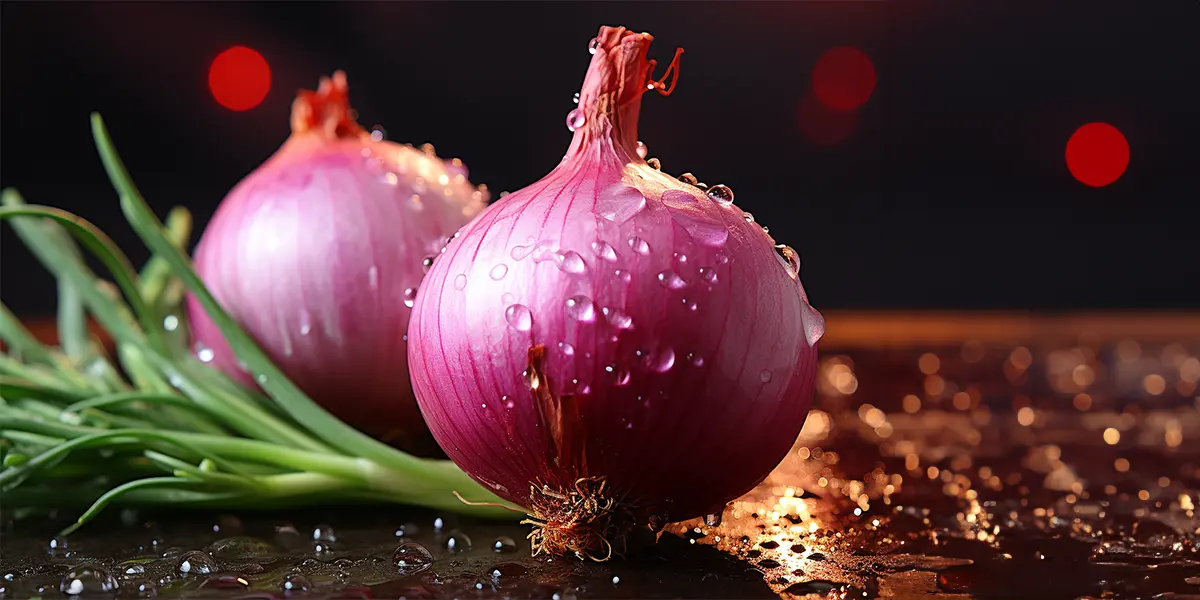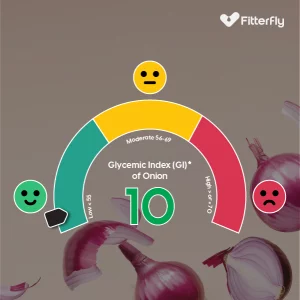Is an Onion Good for Diabetes? Know about Onions and Diabetes

Onions and diabetes might seem like a tricky match, but the truth is onions can be a part of a diabetes-friendly diet.
“I don’t like onions because they make my breath smelly after eating them. Yuck!”
We have all said it or heard it before! But the truth is, without onions, our favourite dishes wouldn’t taste half as good. We might joke about onion breath, but imagine pav bhaji, biryani, or chole without onions; it’s like missing the crunch. Onions and diabetes might seem like a tricky match, but the truth is onions can be a part of a diabetes-friendly diet.
In most Indian kitchens, onions are a must. They are like quiet heroes, adding flavour, and they bring out a delicious kick to whichever recipes they are added to. The scientific name of the onion is Allium cepa, and it is closely related to garlic, shallots, etc. We will learn more about onions and Diabetes.
Are Onions Good for People with Diabetes?
Onions are a root vegetable that people with diabetes can safely eat. The other root vegetables, such as potatoes, sweet potatoes, arbi, and yams, are high in starch and have a high glycemic index, and they can cause spikes in blood sugar levels quickly when eaten in larger portions. So, these starchy root vegetables are taken in limited quantities or avoided in diabetes-friendly diets.
As told before, in most Indian kitchens, onions are a must. Onions are not used as a vegetable in India, but as a base for curries and salads. Onions are added not for their sweetness, but for aroma and savoury flavour. Still, their impact on diabetes management isn’t straightforward.
Onions have some nutritional benefits. Their impact on blood sugar depends on how and with what ingredients they are cooked.
Speaking specifically about onions, they are a healthier choice for people with diabetes. They can help to manage the condition to some extent due to their low carbohydrate content, low GI, fibre content, and other nutritional values. They are great as a part of your meal (like salads), not as a meal by itself.
At Fitterfly, we always recommend that our members include a salad in their diet, and onions are one of the vegetables we recommend adding to a salad, along with other raw vegetables like tomatoes, cabbage, and cucumber.
However, they can still be included in a balanced diet that supports overall blood sugar control. The fibre present in them helps to slow down sugar absorption. Onions have a low glycemic index, so they won’t raise blood sugar too fast.
That said, although onions are generally beneficial for diabetes, they may not suit everyone in the same way. Your daily routine, taste preferences, or family meals may require different choices, and knowing about onions and diabetes. A one-on-one consultation with our nutritionist can help you understand how onions and other foods work on your body, and how to enjoy your meals without compromising your health.
What is the Nutritional Value of an Onion?
As per IFCS, a medium-sized onion contains:
| Nutrient | Amount(100g ) |
| Energy | 25.6kcal |
| Carbohydrate | 2.99g |
| Protein | 2.07g |
| Fibre | 5.21g |
What is the Glycemic Index of Onion?
The glycemic index (GI) of onions is relatively low, with a value of around 10. Foods with a low GI are absorbed more slowly, causing a gradual rise in blood sugar and insulin levels, which can benefit people with diabetes. To know about onions and diabetes, how? Compounds such as quercetin (a powerful antioxidant) and sulfur compounds are present, which can improve insulin sensitivity and also have antimicrobial and anti-inflammatory properties.

Look out for more foods with a low glycemic index.
Onions and Diabetes: What are the Benefits?
- Onions have a low glycemic index (GI), which helps maintain blood sugar levels.
- Onions are rich in antioxidants, mainly quercetin, which is known for its anti-inflammatory properties.
- Onions provide some of the essential vitamins, such as folic acid and vitamin B6, in high concentrations, and minerals like calcium, magnesium, potassium, and phosphorus are also present.
What are the Types of Onions and Their Benefits?
- Pink Onion/Regular Onion: Pink onions are commonly used and are sharp when raw, and are slightly sweet when cooked. They are mostly consumed raw in salads and are mainly used as an add-on to complete your sabzi; they are also essential in making gravies and curries. They are rich in antioxidants, making them a crunchy addition to your diet.
- White onion: White onions have a mild, slightly sweet, and not too sharp taste. They are frequently used in cooking. Uses in Mexican dishes, salads, raitas and sandwiches. They contain sulfur compounds, which have many health benefits.
- Spring Onion: Spring onions, also known as green onions, have a milder flavour and are used in sabzi, as a garnish, and in salads. These are light on calories and perfect for adding crunch and freshness to food.
How Can Onions Be Added to the Diabetes Diet?
Name any dish, and onions are probably part of it.
- Salads: Onions are added to salads for an extra crunch and flavour. For example: A mix of sliced onions, cucumbers, and tomatoes makes a cool, healthy side.
- Chilla: Chilla, a savoury dish made of besan (gram flour), which includes finely chopped onions to enhance its flavour and texture. Onions add a slight crunch to make chilla a delightful breakfast or a snack option that is both nutritious and diabetes-friendly. Spring onions are also tasty.
- Spring Onion Paratha: It is a yummy stuffed paratha made with finely chopped spring onions. This paratha is particularly tasty when eaten with dahi or a vegetable curry.
- Pyaz ki Sabzi: Pyaz ki sabzi, which is not very common. It is a simple and flavorful dish made with onions and basic spices. It could be a clever way of enjoying the healthy benefits of onions while keeping them diabetes friendly. Sambhar: Add baby onions to sambhar along with dal and other vegetables. These onions add natural sweetness and extra flavour.
- Zunka Bhakar: Zunka is a classic Maharashtrian dish made with spicy, onion-based besan, while bhakar is a millet roti which is served alongside. Onions are added to give zunka its rich flavour. This dish is a balanced meal, which is rich in fiber and also has nutrients, making it a good choice for managing diabetes. Just as sarson ka saag and makki ki roti are popular in Punjab, zunka bhakar holds a special place in Maharashtra.
- Chutneys and Raita: Onions can be used in making raita and chutneys. Onion chutney is a popular accompaniment to dosa and idlis, adding a tangy and spicy flavour.
- Curries: Onions are used as a base ingredient in many Indian curries. They add richness and flavour to the dish, not only making it nutritious but also yummy. For example, South Indian sambar often includes onions for added taste.
- Wraps: Adding sliced onions to wraps can enhance their flavour. Onions fit right in, whether it’s a vegetable wrap with cucumber and tomatoes.
- Soaked onions: Thinly sliced onions are mixed with lemon juice or vinegar, salt, and sometimes a bit of chaat masala. They add a tangy and crunchy bite to the meal. (Tip: Use lemon juice instead of vinegar for a more natural option, and avoid adding sugar or sweet sauces.)
- Gravies: For preparing curries, we often use cashew paste, but you can try using onion paste for a lighter and healthier option.
- Onion Pickle: Take small onions or sliced onions. In a pan, bring half a cup of water and half a cup of vinegar to a boil. Now, add some mustard seeds, green chilli, or a pinch of turmeric. Pour this hot mixture over the onions. Let it cool, and keep it in the fridge. You can eat it after a few hours. Since there is no sugar added, it’s a tangy and safe side for people with diabetes.
When to Consume Onions to Control Blood Sugar Levels (onions and diabetes)?
You can eat onions at any time of the day. To keep blood sugar levels steady, it’s best to pair them with low-GI foods.
For example, mix onions with other high-fibre vegetables like cucumber, tomatoes, or carrots, or sprouts to make a healthy salad. Sprinkle some flax or chia seeds.
Is It Safe to Eat Raw Onions Daily for People with Diabetes?
It is usually safe to consume raw onions in moderation daily. Their low-calorie and carbohydrate content make onions a healthy option. But excessive eating of any food can lead to health issues. For instance, some people may experience acidity, while others develop bad breath after taking raw onions.
Who Should Limit or Avoid Eating Raw Onions?
Let us know more about onions and diabetes. Usually, onions are beneficial for most people, but some may need to cut their intake. If they eat, they might have discomfort or digestive issues. In such cases, it is best to eat them in their cooked form or consult with a nutritionist.
What Are the Possible Side Effects of Eating Onions for People with Diabetes?
Eating Onions is usually safe for people with diabetes, but some of the side effects are:
- Allergic Reactions: Some people may be allergic to onions. If you experience any unusual symptoms, such as itching or swelling, after eating onions, you may be allergic.
- Heartburn or Acid Reflux: Onions can cause a burning sensation in the chest or trigger heartburn. So, it is always best to reduce the intake of onions or totally avoid them.
- Flatulence: Sometimes onions can lead to gas and bloating. In case you experience, consider moderating your intake.
Here is How Fitterfly Can Help You Manage Diabetes Better
Onions are a very common vegetable that we use in daily cooking. They make our dishes complete, whether it’s a hot onion pakode, chilla made with spring onions, or just a salad. To know about Onions and diabetes, with the proper guidance, even everyday ingredients like onions can support better blood sugar control.
At Fitterfly, we understand that it’s important to manage diabetes while enjoying your meals. Onions are healthy and, when eaten properly, can help to control blood sugar levels. That’s why we often suggest adding onions to your meals.
So, about onions and diabetes, when planning diet plans, we recommend eating onions in moderation and combining them with other vegetables, such as tomatoes, cucumber, or cabbage. This not only adds flavour to your meals but also helps in blood sugar control. But it doesn’t stop at diet.
At Fitterfly, we offer personalised guidance from our fitness coaches. Our fitness coaches help you to incorporate the right exercises into your daily lifestyle, tailored to your individual needs. Our success coaches ensure you stay motivated and on track with your health goals.
Please leave us a missed call on 08068507599 to connect with our program advisors and discover how Fitterfly can support you in managing diabetes and achieving your health goals.
This blog provides general information for educational and informational purposes only and shouldn't be seen as professional advice.
Frequently Asked Questions
Are onions suitable for people with diabetes?
Yes, onions can be a good choice for people with diabetes when consumed in moderation.
Do onions raise the levels of blood sugar?
Onions have a low glycemic index(GI), so they does not cause a rapid rise in blood sugar when consumed in moderation.
Are cooked onions still good for diabetes?
Yes, cooked onions still offer benefits, although some nutrients may be slightly reduced after cooking.
Can I eat onion pickles or soaked onions?
Yes, but avoiding eating onion pickles and taking soaked onions in a smaller amount of vinegar is a better option than sugary pickles.





















